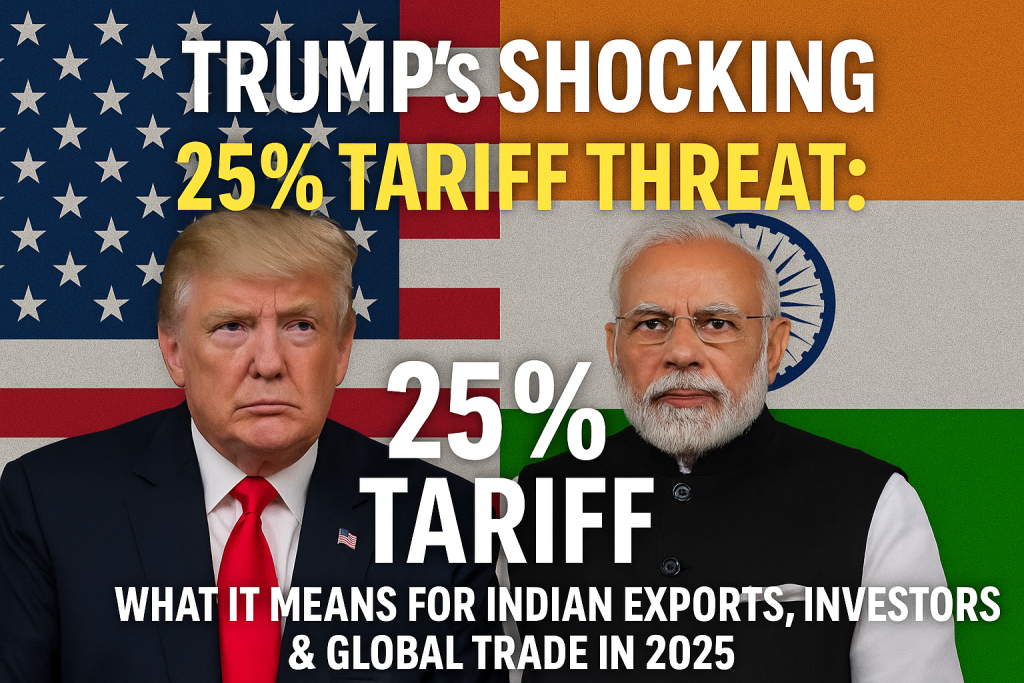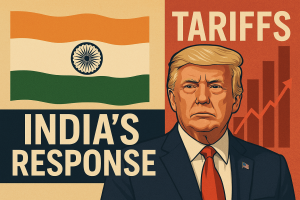Introduction: A Trade Storm Brewing
Former U.S. President Donald Trump’s recent announcement of a 25% tariffs on all Indian imports has stirred fresh concerns over the stability of India–U.S. trade relations. Labeling India as a “dead economy” and citing India’s close ties with Russia, Trump threatened to penalize Indian goods if his 2024 comeback materializes.

This isn’t the first time Trump has used tariffs as a foreign policy tool. However, India’s measured and confident response this time underscores a maturing economic diplomacy—one that’s guided by national interests and resilient strategic thinking.
MEA’s Stand: Strategic Partnership Is Bigger Than Tariffs
The Ministry of External Affairs (MEA), led by spokesperson Randhir Jaiswal, responded calmly yet firmly:
“India–U.S. ties stand on their own merit. We have strong defense cooperation, vibrant people-to-people connections, and mutual strategic interests.”
Jaiswal dismissed the idea of any rupture in ties due to India’s oil and defense purchases from Russia, stating that:
“Our sourcing is based solely on national security imperatives and global market conditions.”
By choosing not to retaliate verbally, the MEA emphasized mature diplomacy over sensationalism, showcasing India’s broader vision for bilateral ties.
Commerce Ministry: No Compromise on National Interests
Commerce Minister Piyush Goyal took a more direct stance in Parliament:
“India is on its way to becoming the third-largest economy. We reject the ‘dead economy’ label. We will protect our farmers, workers, and entrepreneurs at all costs.”
Goyal highlighted that while India is open to a trade deal, it will not compromise on:
- Agriculture and dairy protections
- GM food regulations
- Sovereignty over domestic policy
He further stressed that India prefers no deal over a bad deal, reiterating that coercion will not work.
India–U.S. Trade Relations: A Quick Snapshot
| Metric | 2024 Value |
|---|---|
| Bilateral Trade Volume | $191 billion |
| India’s Trade Surplus | $43 billion |
| Top Indian Exports | Pharma, textiles, IT services |
| U.S. Demands in Trade Talks | Lower agri-tariffs, e-commerce rules |
| Sensitive Indian Sectors | Dairy, agriculture, digital data |
This isn’t just about tariffs. The underlying tension is rooted in deeper policy differences around market access, data localization, and regulatory sovereignty.
Decoding Trump’s Concerns
Why Is Trump Targeting India?
- Russia Ties: India’s continued oil imports from Russia have drawn criticism in Washington.
- Trade Surplus: India runs a trade surplus with the U.S., which Trump sees as unfair.
- Domestic Politics: Trump’s tariff rhetoric is designed to appeal to protectionist voters in America.
However, many analysts argue that these moves could backfire by weakening U.S. access to one of the world’s fastest-growing consumer markets.
India’s Counter Strategy
India has adopted a “wait-and-negotiate” approach. According to government sources:
- India is preparing a point-by-point rebuttal of U.S. claims.
- It is working with other G20 countries to de-escalate unilateral trade actions.
- No immediate counter-tariffs are being considered.
Trade officials are also gearing up to host a high-level U.S. delegation later this month. Talks are expected to focus on e-commerce rules, data sovereignty, and market access for MSMEs.
Global Implications
If Trump’s tariffs are implemented:
- It could lead to a new wave of protectionism, disrupting global supply chains.
- Other countries may follow suit, leading to retaliatory tariffs.
- India may strengthen trade ties with ASEAN, Africa, and the EU as hedging strategies.
Expert Opinions
Dr. Arvind Subramanian, former Chief Economic Adviser:
“India must hold its line. Tariff threats are a negotiating tactic—not a strategy.”
Ruchir Sharma, Global Investor:
“India’s long-term growth story remains intact. A confident response, not panic, is the right course.”
Final Take: Strategic Calm Over Reactive Chaos
India’s response to Trump’s tariffs reflects a confident, sovereign nation that is unwilling to bend under pressure. Whether Trump’s threats materialize or not, New Delhi has made one thing clear:
Economic partnerships must be rooted in fairness, respect, and mutual gain—not fear or coercion.
As the global power balance continues to shift, India is asserting its role not just as a trading partner, but as a strategic equal on the world stage.



